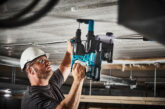
Martin Dunn, Senior Training Officer at Makita, explains why it is so important for tradespeople to complete regular training throughout their career to ensure safety on-site, and what to look for when selecting a course.
Whilst working with power tools and machinery is second nature to any professional electrician, it is paramount to keep abreast of changing technologies and product features in order to ensure the correct and safe use of any type of tool. It might be a commitment that gets pushed down the jobs list, particularly for those who have been working in the industry for some time, but it is important to undertake regular training to avoid any risks. In fact, according to Health and Safety Executive (HSE), of the 142 people killed in work accidents in 2020/21, 39 worked in construction – and 14 fatalities were as a result of contact with moving machinery.
Why is regular training so important?
The Provision and Use of Work Equipment Regulations (PUWER) 1998 requires those who own or operate work equipment to receive adequate training to ensure their safety. It also stipulates that equipment must be maintained correctly and be safe for use. It is important for good health and safety practices to be established from the start of an electrician’s career to ensure that they’re safely using the tools from day one. Professionals should continue to keep their knowledge and safety practices up-to-date with training at regular intervals throughout their career. This is especially important when new tools or machines are added to their kit.
What should the training cover?
The nature of construction means that the working environment can present a number of potential hazards, which is why it is important to seek out comprehensive training programmes that cover what these dangers are and how to minimise the risks. As well as the safe use of individual tools and machines, professionals should also ensure they can identify and safely manage workplace dangers and risks including:
Dust – the inhalation of harmful silica dust is a significant risk for electricians as it is generated from tasks including cutting, drilling and chasing. It can be easily breathed in and over time can lead to serious, long term (even life-threatening) diseases such as lung cancer, Chronic Obstructive Pulmonary Disease and silicosis.
Noise – all power tools produce noise and when used regularly and over extended periods, there is a significant risk of hearing damage, including permanent tinnitus.
Vibration – this is serious risk that any power tool user should take seriously. Without the proper precautions taken, permanent damage can be incurred through Hand-Arm Vibration such as Vibration White Finger and carpal tunnel.
Some power tool manufacturers offer training programmes that cover these topics and more across short classroom and practical sessions. For example, Makita UK’s City & Guilds approved correct and safe use ‘Be Safe – Construction’ courses can be tailored to any particular trade discipline. The course, offered on an individual or group basis, provides training on best practices, how to select and safely handle/store power tools, health and safety considerations and PPE policies. It also includes a practical element where participants can get hands-on with the tools and technologies. Courses can also be tailored to meet individuals’ needs and can be delivered on-site or at one of Makita’s training centres across the UK.
To find out more about Makita’s training offering click here









